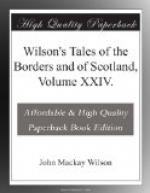XXIV.
THE SIEGE: A DRAMATIC TALE.
DRAMATIS PERSONAE.—SIR ALEXANDER SETON, Governor of Berwick; RICHARD and HENRY, his sons. PROVOST RAMSAY. HUGH ELLIOT, a traitor. KING EDWARD. EARL PERCY. MATILDA, wife of Seton; etc.
SCENE I.—A Street—the Market-place.
Enter SIR ALEXANDER SETON, RICHARD and HENRY (his sons), PROVOST RAMSAY, HUGH ELLIOT, and others of the People.
Provost Ramsay.—Brither Scotchmen! it is my fixed an’ solemn opinion, that the King o’ England has entered into a holy alliance wi’ the enemy o’ mankind! An’ does he demand us to surrender!—to gie up our toun!—our property!—our lives!—our liberty!—to Southern pagans, that hae entered into compact wi’ the powers o’ the air! Surrender! No, Scotchmen! While we breathe, we will breathe the breath o’ Freedom! as it soughs down the Tweed, between the heathery hills o’ our ain auld country! I am but provost o’ Berwick, Sir Alexander, an’ ye are its governor; an’ in a time like this, the power o’ defending or surrendering the gates is yours; but though ye gie up the keys this very hour, an’ were every stane o’ the walls turned are upon anither—here!—the power to defend this market-place is mine!—and here will I stand, while this hand can wield a sword, or a Scotchman is left to die by my side!
Sir Alex.—Fear not, good provost; I through life have learned To live with honour, or with honour fall.
Richard.—And as the father dies, so shall his sons. What sayest thou, Henry?
Henry.—I would say but this— (If one with a smooth chin may have a voice)— When thou dost nobly fall, I’ll but survive To strike revenge—then follow thy example.
Provost Ramsay.—Bravely said, callants! As sure as death, I wish ye were my sons! Do ye ken, Sir Alexander, the only thing that grieves me in a day like this, is, that I hae naebody to die for the glory an’ honour o’ auld Scotland but mysel? But, save us, neebor Elliot! ye look as douf an’ as dowie-like as if ye had been forced to mak yer breakfast o’ yer coat-sleeve.
Hugh Elliot.—–In truth, methinks, this is no time for smiles— In every street, each corner of the town, Struck by some unseen hand, the dead are strewed; From every house the children’s wail is heard, Screaming in vain for food; and the poor mother, Worn to a skeleton, sits groaning by! My house, ’tis known, o’erlooks the battlements; ’Tis not an hour gone that I left my couch, Hastening to speed me hither, when a sound, Fierce as the thunders, shook our firm-built walls: The casements fell in atoms, and the bed, Which I that moment left, rocked in confusion: I turned to gaze on it, and I beheld!—beheld My wife’s fair bosom torn—her heart laid bare! And the red stream came oozing to my feet! Is this a time for smiles!




